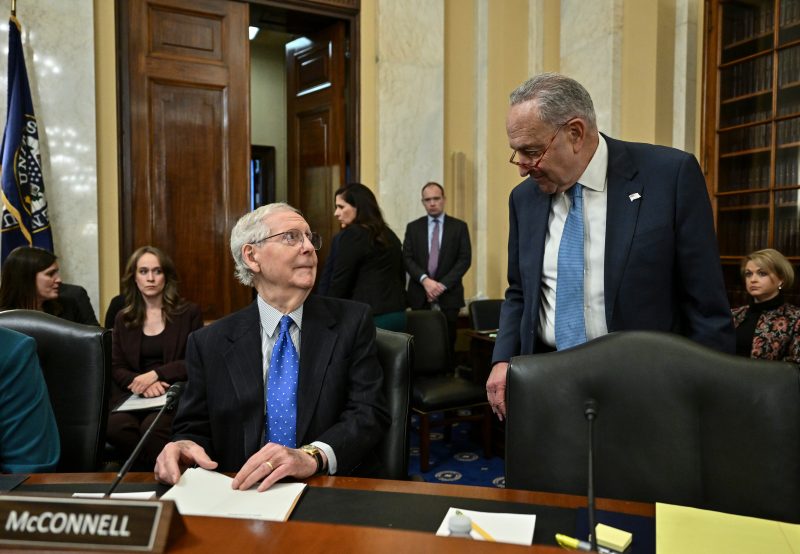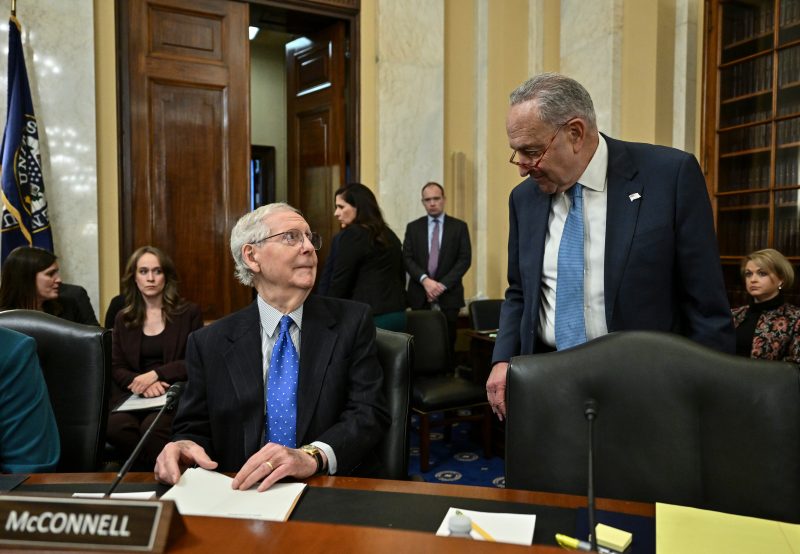
One Senate leader exited the long negotiations on border and global security with a bitterly divided caucus, as some rank and file clamored for his resignation. The other Senate leader ended those talks with an almost perfectly unified caucus, believing he had scored both a policy and political win.
But now, after four months of working about as closely as they have in their seven years overseeing the Senate together, Minority Leader Mitch McConnell (R-Ky.) and Majority Leader Charles E. Schumer (D-N.Y.) are moving into the season in which they’ll return to the more familiar posture of hand-to-hand political combat.
In separate interviews over the past few days, McConnell and Schumer detailed the long negotiations that ended with a $95 billion national security package sent to the House. But each leader knows that with only a few must-pass bills remaining on the docket, the next nine months will be much more focused on political battles for control of the Senate and the agenda for whichever side also wins the presidency in November.
McConnell, with more than 17 years as leader, expressed little concern about how much the far-right flank of the Senate GOP conference came after him — both over his policy decisions and his continued distancing from the likely presidential nominee, Donald Trump.
“You remember what Harry Truman said about if you want a friend in Washington, buy a dog?” McConnell said, predicting that Senate Republican unity could come through winning the majority. “Look, I don’t have a litmus test for what kind of a Republican [candidate I want]. I think our goal is to get to 51. And when you’re at 51, you control the agenda.”
Schumer rejects the idea that his incumbents are on defense, particularly after the border negotiations unraveled when Trump demanded Republicans back away for political reasons rather than trying to resolve the issue. Democrats facing tough reelections then got the benefit of voting for what they consider a strong border-migration bill and plan to use the GOP’s reversal and rejection of it as a cudgel when they face political attacks over conditions at the border.
“Our members who are up in 2024 can point to a real tough border bill that was supported by the Wall Street Journal (editorial page), the Border Patrol union and the Chamber of Commerce,” Schumer said.
At this stage, Schumer even likes the positioning of Sens. Sherrod Brown (D-Ohio) and Jon Tester (D-Mont.), who represent states where President Biden’s campaign is not mounting a forceful effort.
Schumer is defending 23 seats in November, while McConnell is defending just 11. Currently 51-49 in Schumer’s favor, the Senate majority next year could depend on the winner of the likely rematch between Biden and former president Trump if the Senate again deadlocks at 50-50 as it did in early 2021.
Democrats are trying to make Sen. Ted Cruz (R-Tex.) face another tough race, but he remains a prohibitive favorite, as does Sen. Rick Scott (R-Fla.). Every other GOP seat remains solidly in McConnell’s column.
McConnell has virtually banked one seat following the retirement announcement of Sen. Joe Manchin III (D-W.Va.) in a state that Trump won by an average of roughly 40 percentage points the past two elections. Beyond the Montana and Ohio contests, McConnell is closely watching another handful of Democratic seats in states Biden narrowly won.
“I think that this is the best map I’ve seen in a long time,” McConnell said.
But Schumer’s candidates are steadily raising more funds for their races, dramatically so in some contests, continuing a trend that has alarmed GOP strategists in recent years. With no fix in sight, McConnell has turned to super wealthy candidates who can write their own campaign checks, in Pennsylvania and Montana, and Schumer believes those GOP nominees can be pilloried as out-of-touch millionaires.
And, perhaps most important, Schumer believes that all the talk of Biden’s sagging poll numbers weighing down Democratic candidates is overblown and that Trump will present as a much bigger anchor for GOP candidates.
On a call with his staff in early November, the majority leader recalled realizing that embracing the “MAGA demand” for linking border security and Ukraine funding would be a benefit.
“We realized that doing border with Ukraine was a win-win for us, a win to get Ukraine and Israel [aid], but a win on the border because now Democrats could actually put together a strong, tough border bill,” he said.
The bipartisan talks produced a compromise bill — something more conservative leaning than any border-immigration legislation considered this century — but Trump all but ordered the GOP to back off so the border would remain a potent political issue ahead of the election.
Schumer believes that youthful liberals who are furious over Biden’s handling of Israel’s war with Hamas will eventually realize that another Trump presidency is repulsive to their core values.
“It is a decent bet that more Republicans do not vote for Trump than Democrats do not vote for Biden,” he said, pointing to self-identified “Bush Republicans” whose core values run diametrically opposed to Trump. “They tend to be suburban. They tend to be more affluent. They tend to be college educated.”
Those used to be the core GOP base voters when McConnell, 81, entered the Senate in 1985. But today’s Republican Party relies much more heavily on rural, non-college-educated voters who cheer on Trump’s grievance-based, America-first nativism. That played out during the border-global security negotiations.
“I’m not surprised at all that the Republican voters around the country feel this way because our likely nominee for president is against the bill,” McConnell said. “That had an impact on some of our members.”
He disagreed with Trump’s assessment that passing the compromise might have helped Biden if it helped slow the tide of migrants arriving at the border. But once it became clear how divisive the border issue was, McConnell focused on getting the funding for Ukraine, Israel and Taiwan through the Senate in a rare moment that he knew would divide his conference, but he was willing to suffer the consequences.
“My personal view here was that I thought this was so important for our country, and for the rest of the free world, that I wanted to do my very best to do the right thing,” he said.
Every GOP incumbent running in November opposed the security bill. Just two of the 17 Republicans who took office in the last five years supported it.
Is he too out of step to keep leading his conference? Will he run again for leader after the elections?
“I don’t have any announcement to make,” McConnell said.
One reason McConnell feels better than two years ago, when early polling suggested Republicans should win the majority, is that he has an ally running the National Republican Senatorial Committee this time around.
“We have a very good working relationship with the NRSC,” McConnell said, noting a close working bond he retains with Sen. Steve Daines (R-Mont.).
Throughout the 2022 campaign, McConnell publicly feuded with his NRSC chair, Scott, who did not play favorites in party primaries and ended up with several poor general-election candidates. Scott also used his post to promote his own agenda for the party, prompting even more feuds with McConnell and other Senate leaders.
Despite Daines’s more populist tendencies — he was an early endorser of Trump and opposed the national security package — the duo have been in sync trying to thwart potentially bad candidates from getting an edge in GOP primaries.
“Daines is very much in my group of people who feel you need a quality candidate,” McConnell said.
He and Daines both recruited former Maryland governor Larry Hogan, whose wife, Yumi, is friendly with McConnell’s wife, former Cabinet secretary Elaine Chao.
“We pulled out all the stops, both personal and political,” McConnell said.
Schumer has adopted his own version of Biden’s political euphemism of “don’t compare me to the Almighty, compare me to the alternative,” noting these elections will always be a choice.
At this stage of the 2022 campaign, Biden’s approval rating was 18 points upside down in the most critical states, he noted. But when voters got asked if they preferred a Republican or Democrat as senator, it was a virtual tie.
By the time November comes, Schumer expects most of these GOP candidates to be tied so closely to Trump that voters will recoil, just as they did in 2022. More moves by the likely Republican nominee torpedoing bipartisan compromises would be just the sort of boost Schumer would love.
“The gift, the MAGA gift, kept giving,” he said.

